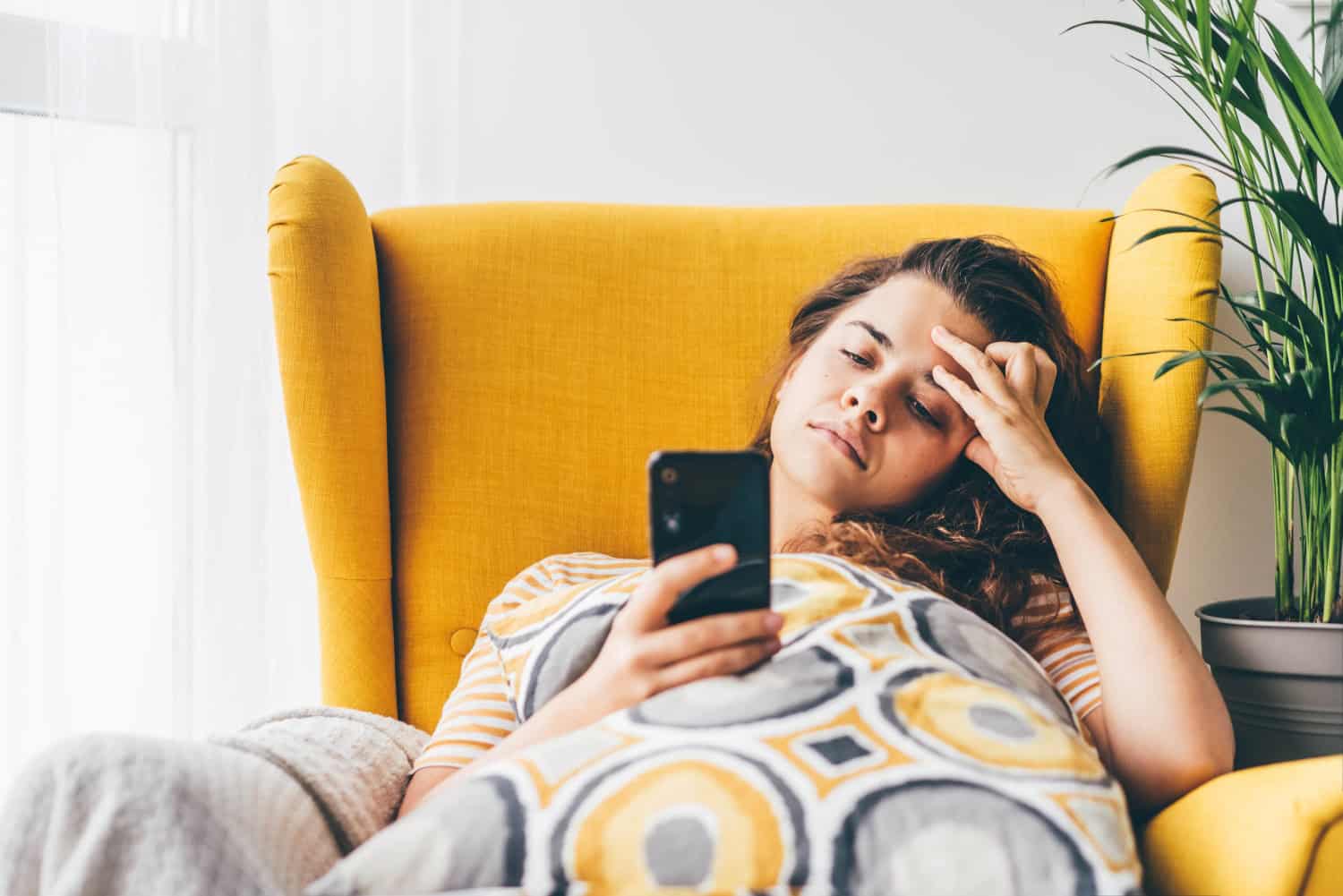In today’s hyper-accelerated, digitally obsessed culture, smartphones have become ever-present, serving as more than just a means of staying connected with our loved ones; they are, in a sense, an extension of ourselves.
These handheld devices are more than just tools; they contain much of our existence, reflecting our habits, interests, and connections.
Over the years, mobile phones have become our calendars, workspaces, health trackers, and a significant part of our social lives.
So much about us exists in this candy bar-shaped digital mechanism, shaping our daily routines and interactions.
That said, with the exponential rise in social media addiction, it’s wise to ask yourself, are you addicted to your phone?
It’s important to note that social media addiction is one of the most common types of phone addiction since most people access social media through their mobile devices.
However, not all phone addiction is social media-related. For instance, you might be addicted to dating apps, games, or even the news.
Here, we will focus on social-media-related phone addiction, including symptoms and effective treatments that can help.
Before we begin, if you are concerned about your online habits and are worried that you may be struggling with phone addiction, remember that you are not alone.
Help and support are readily available.
How we can help: Behavioural rehab addiction facility, Ontario, Canada
At Centres for Health and Healing, we help individuals grappling with a range of addiction issues, including internet addiction.
Our evidence-based and experiential treatment approaches, including behavioural addiction treatment and trauma-informed therapy, are designed to help our clients understand and overcome their issues with dependency.
As soon as you step through the door, you will be welcomed by a team of experienced, compassionate professionals who understand the various challenges of addiction and the steps it takes to overcome these issues.
We provide individualized inpatient and outpatient treatment for a wide range of addictions, including substance use disorder and behavioural addictions like gaming and internet addiction.
This can include personalized therapy sessions, group support, and aftercare planning tailored to your specific needs and preferences.
To learn more about your treatment options, contact our professional team in Ontario today, who will gladly provide further help and support.
We are here and ready to guide you through the necessary steps to feeling better and regaining control over your life.
Are you addicted to your phone? The rise of social media addiction
Most of us have been there – doom scrolling through whatever content our feeds have decided matches our interests and habits.
Social media platforms like Facebook and Instagram are designed to grab your attention and hold it for as long as possible.
Whenever you post or share content, any likes, shares, or comments you receive from loved ones and even total strangers give your brain an immediate dopamine hit, making you want to post more.
This is all okay until you begin relying on those quick dopamine boosts to feel good about yourself or distract from whatever issues or daily challenges you might face.
Staying connected is important, but there is a rising concern over the negative impact of excessive social media use, including phone and social media addiction.
We’re here to help.
Contact us today for a no-obligation conversation with one of our professionals.
Below are some signs you may be addicted to your phone.
1. You check your phone first thing in the morning and last thing at night

Researchers found that individuals who reach for their phone first thing in the morning and follow the same ritual last thing at night may be demonstrating strong signs of phone addiction.
Whether it’s an unexpected message from a friend, a new “like” on a recently uploaded photo, or a fresh video on your newsfeed, each notification delivers a small burst of immediate gratification.
Technology companies cleverly curate these experiences using persuasive design strategies.
Features like limitless scrolling, real-time updates, and tailored content aren’t just coincidental; they’re intentionally designed to keep you addicted and make logging off and going into the “real world” feel like a challenge or simply boring in comparison.
So, if you find yourself reaching for your phone as soon as you open your eyes in the morning or before you close them late at night, this could indicate you may be struggling with phone addiction and may need the support of a professional to help you manage and overcome these behaviours.
2. You experience anxiety or irritability when you can’t access your phone
Another common symptom of phone or social media addiction is when you feel anxious or irritable when not using your device or being unable to access it.
Individuals who experience anxiety or frustration when they cannot, for whatever reason, access their mobile device may be suffering from “nomophobia,” a condition characterized by the fear of being without your phone.
This fear can be so intense and centralizing that it interferes with your daily life and relationships.
Nomophobia has become more common in recent years and may be one of the most prevalent signs of phone addiction.
3. You compare your life to others online
Social media scrolling can be a fun way to pass the time and distract ourselves when bored or lonely.
However, doom scrolling often results in comparing our lives to that of others.
We’ve all been there.
You are happily sitting on a train, scrolling through your feed and suddenly that person you went to preschool with uploads a picture, draped over a salty rock in the middle of the Caribbean sea, with the hashtag, “living my best life” surrounded by a swarm of happily tanned friends smiling and holding cocktails.
Suddenly, your life doesn’t feel as interesting or exciting, like you are missing out on something or should be doing anything other than the daily grind of rush hour.
Your mood shifts from content and happy to sad and frustrated – all with the snap of a picture.

What the research says
One study by ScienceDirect explains that social media comparisons represent a fundamental human cognition across cultures.
They help humans navigate social groups by providing them with information about their own relative standing.
Despite these benefits, upward comparisons—with those who do better than oneself—have been identified as potentially problematic, especially on social media. (ScienceDirect, Social comparison and envy on social media: A critical review, June 2022).
If you find yourself constantly comparing yourself to others on social media, this may be a sign you are spending too much time online and may be grappling with phone addiction.
Speaking to a trained professional can help you get the support you need to reduce your phone use and regain control over your online habits, increasing your self-esteem and confidence.
4. Neglecting your real-life relationships or responsibilities
Another sign you may be addicted to your phone is if you constantly ignore calls from friends and loved ones, miss school or work deadlines, skip meals, or lose sleep because you’re too busy online.
Neglecting your real-life relationships and daily responsibilities can lead to various complications, including job loss, relationship strain, health issues, and many other challenges.
Suppose you’ve neglected other aspects of your life due to excessive phone or social media use.
In that case, you must speak to a professional who can help you get your life back on track and teach you healthier coping skills to reduce the amount of time spent on your phone.
Other symptoms of phone addiction
As well as the symptoms mentioned above, there are some other additional signs of phone addiction you should be aware of.
Note: The following terms are relatively new and are used to describe some of the symptoms of phone addiction.
They include:
- Ringxiety – Describes the feeling that a notification has come through on your mobile device when, in reality, it hasn’t.
- Textaphrenia – Fearing that you are unable to receive or send text messages.
- Textiety – Experiencing extreme anxiety about receiving and responding to text messages straight away.
Other common symptoms include:
- Experiencing anxiety, sadness, anger, or profound frustration when you are unable to check your phone.
- You spend much of your time on your phone.
- Your phone use is having a negative impact on your personal and professional life.
- You find it hard to reduce the amount of time spent on your phone and end up relapsing quickly.
- You wake up in the middle of the night to check your phone and notifications.
Common health risks associated with phone addiction
Much research has shown various health risks associated with chronic phone addiction and social media use.
These risks include mental and physical health issues, particularly in young people.
Some of the most common health complications of phone addiction include:
- Anxiety.
- Depression.
- Impaired cognitive function.
- Substance abuse.
- Muscle stiffness and joint pain.
- Dry or red and irritated eyes.
- Wrist and/or thumb pain.
- Sleep disturbances.
- Poor school or work performance.
- Engaging in reckless or dangerous behaviours when using your phone, such as driving or riding a bike.
Overcoming phone addiction

Specific types of therapy can be highly effective for treating phone addiction and are often similar to those used in other areas of recovery, such as substance abuse.
Common treatments used to treat phone addiction include:
- Cognitive behavioural therapy (CBT) – Helps address any negative thoughts and beliefs that may have led to phone addiction in the first place. This may include low self-esteem, unresolved trauma, and other emotional issues that fuel this type of addiction.
- Group therapy – Enables you to connect and share your experiences with others who have walked a similar path. Group support allows you to stay accountable while navigating recovery in a compassionate, supportive way.
- Mindfulness therapy teaches various strategies and techniques, such as deep breathing and meditation, to help you stay present and grounded, allowing you to remain in control and more emotionally regulated.
- Aftercare and support – We provide personalized care and support after you complete inpatient (or outpatient) treatment. Our aftercare program includes up to 12 months of follow-up services, support groups, therapy, and community involvement.
The bottom line
You must remember that your phone is not the enemy—it’s how you use it that matters.
If your phone dominates most of your daily life – it might be worth reassessing your online use and digital habits.
Self-awareness is key when it comes to phone addiction and can be the first step toward lasting change and recovery.
If you can admit you have a problem with your phone use, it puts you in a position to do something about it and shows strong accountability, increasing your chances of successful, lasting recovery.
You don’t have to navigate all this alone.
Support and guidance are available, and our team is here and ready to help you find your unique path to recovery, whatever that may look like.
Speak to a specialist today in confidence and begin your journey to lasting health and transformation.





